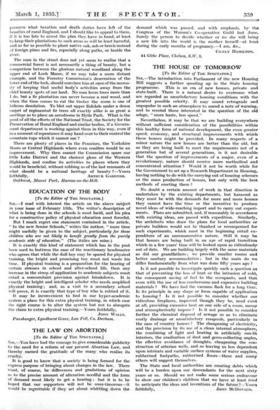THE HOUSE OF TOMORROW [To the Editor of THE SPECTATOR.]
Sm,—The introduction into Parliament of the new Housing Bill suggests a further speeding up in the State housing programme. This -is an era of new houses, private and state-built. There is a natural desire to overcome what are regarded as unsatisfactory housing conditions with the greatest possible celerity. It may sound retrograde and unpopular in such an atmosphere to sound a note of warning, and to remind those interested in the question of the old . adage, " more haste, less speed."
Nevertheless, it may be that we are building everywhere without sufficient consideration of the possibilities within this healthy form of national development, the even greater speed, economy, and structural improvements with which ; these houses might be provided. In many respects of a minor nature the new houses are better than the old, but as they are being built to meet the requirements not of a generation but of several generations, is it not desirable that the question of improvements of a major, even of a revolutionary, nature should receive more methodical and concentrated attention ? Would it not be worth while for the Government to set up a Research Department in Housing, having nothing to do with the carrying out of housing schemes or the mass production of houses, but only with the best methods of erecting them ?
No doubt a certain amount of work in that direction is undertaken by the existing departments, but harassed as they must be with the demands for more and more houses• they cannot have the' time or the incentive to produce novel ideas of wide-reaching import and to carry out experi- ments. Plans are submitted, and, if reasonably in accordance with existing ideas, are passed with expedition. Similarly, the architects who draw the plans for local authorities or private builders would not be thanked or recompensed for such experiments, which must in the beginning entail ex- penditure of an unremunerative nature. Still it may be that houses are being built in an age of rapid transition which in a few years' time will be looked upon as ridiculously out of date. We are building largely with the same materials as did our grandfathers ; we provide smaller rooms and better sanitary accommodation ; but in the main do we differ fundamentally from what was done fifty years ago ?
Is it not possible to investigate quickly such a question as that of preventing the loss of' heat or the intrusion of cold, the consequent saving of fuel to the occupants, and that even with the use of less cumbersome and expensive building materials ? We have had the vacuum flask for a long time. Is its principle in any shape or form capable of application to housing Is it not possible to consider whether our ridiculous fireplaces, improved- though they be, need exist at all, providing excessive heat on one side of a room, messy and atmospherically impure ? Is it not possible to consider further the chemical disposal of sewage so as to eliminate costly drainage or unsatisfactory cesspools, particularly in the case of country houses ? The cheapening of electricity, and the provision by its use of a clean internal atmosphere, the combining of light and heating in artificially sun-lit interiors, the eradication of dust and germ-collecting angles, the effective avoidance of draughts, cheapening the con- struction of artesian wells, and so leaving us less dependent upon intricate and variable surface systems of water supplies, rubberized footpaths, rubberized floors—these and many others will suggest themselves.
The State and local authorities are creating debts which will be a burden upon our descendants for the next sixty years or so. Should we not make some serious endeavour to show. our children's children that we have at least tried to anticipate the ideas and inventions of the future 7-7-Yours


























































 Previous page
Previous page